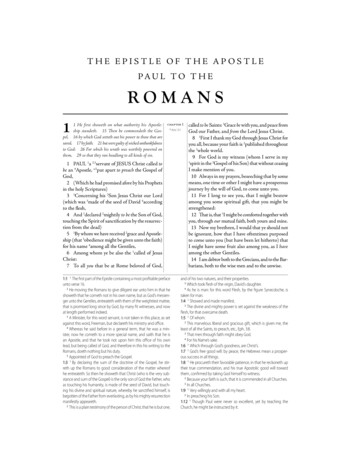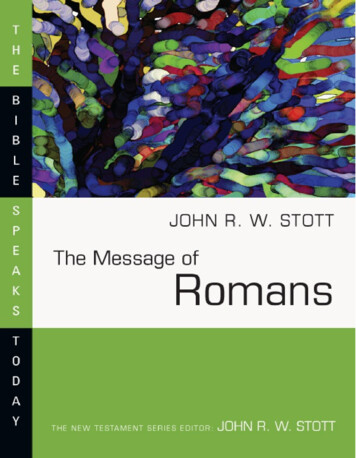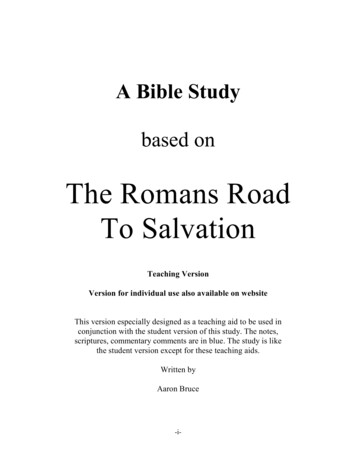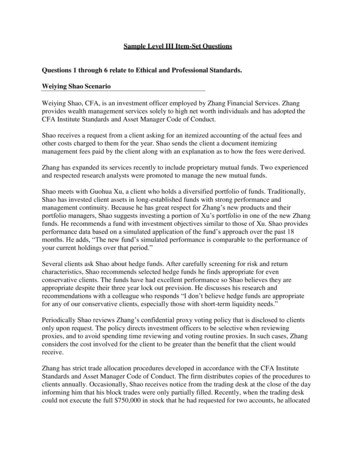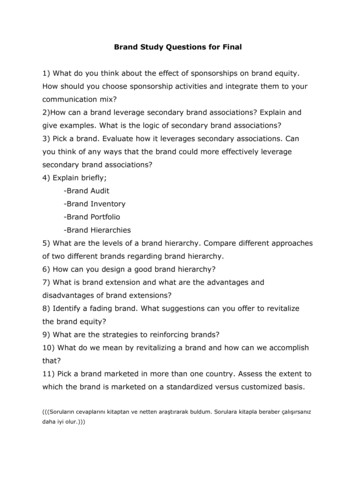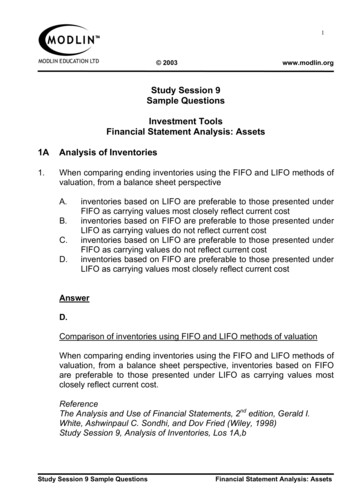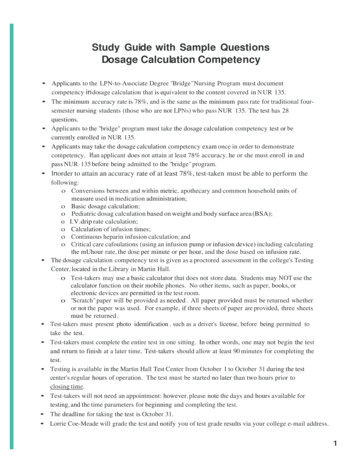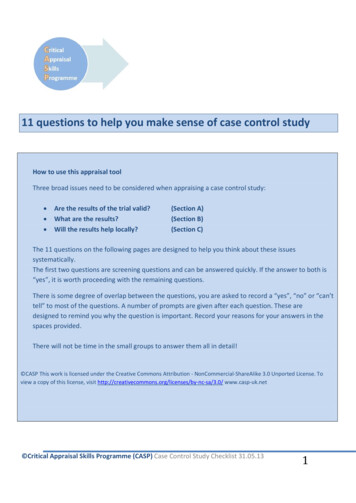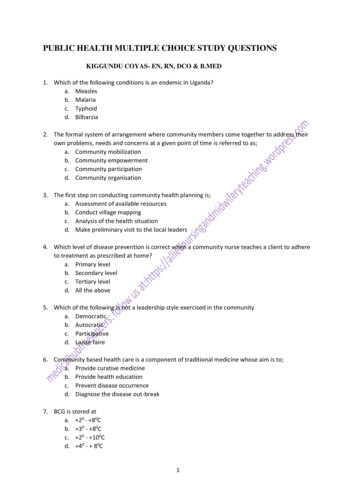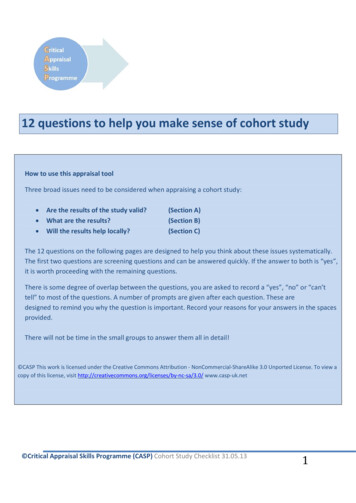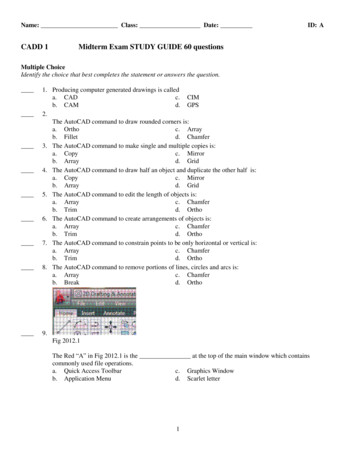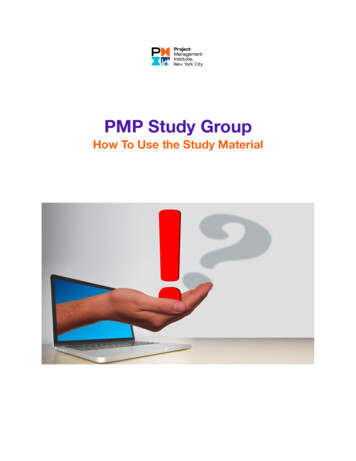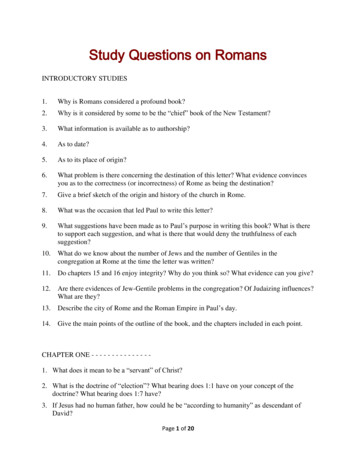
Transcription
Study Questions on RomansINTRODUCTORY STUDIES1.Why is Romans considered a profound book?2.Why is it considered by some to be the “chief” book of the New Testament?3.What information is available as to authorship?4.As to date?5.As to its place of origin?6.What problem is there concerning the destination of this letter? What evidence convincesyou as to the correctness (or incorrectness) of Rome as being the destination?7.Give a brief sketch of the origin and history of the church in Rome.8.What was the occasion that led Paul to write this letter?9.What suggestions have been made as to Paul’s purpose in writing this book? What is thereto support each suggestion, and what is there that would deny the truthfulness of eachsuggestion?10.What do we know about the number of Jews and the number of Gentiles in thecongregation at Rome at the time the letter was written?11.Do chapters 15 and 16 enjoy integrity? Why do you think so? What evidence can you give?12.Are there evidences of Jew-Gentile problems in the congregation? Of Judaizing influences?What are they?13.Describe the city of Rome and the Roman Empire in Paul’s day.14.Give the main points of the outline of the book, and the chapters included in each point.CHAPTER ONE - - - - - - - - - - - - - - 1. What does it mean to be a “servant” of Christ?2. What is the doctrine of “election”? What bearing does 1:1 have on your concept of thedoctrine? What bearing does 1:7 have?3. If Jesus had no human father, how could he be “according to humanity” as descendant ofDavid?Page 1 of 20
4. Is there any evidence in Paul’s writings that he had knowledge of Jesus’ virgin birth?5. What concept do we think of when we find the Scriptures called “holy”?6. What is the point of v. 2 – a parenthesis?7. What “part” of the nature of Christ is spoken of when Paul uses the word “spirit of holiness”?8. What evidence is adduced to prove that Jesus is the Son of God?9. What concepts does the title “Son of God” include? Are we not all “sons of God”?10. What is the significance of the plural word “dead” (1:4)?11. Explain “obedience of faith.” Give at least two possibilities.12. What evidence of the deity of Christ is found in chapter 1?13. If the saints in Rome received what Paul wished for them as in verse 7, what would it meanto them? Just what is the “grace” that God and Christ were to give to them?14. What is significant in the order “grace” and then “peace”? Can peace come before grace?Why?15. What ideas about prayer life can we learn from chapter 1?16. What is meant by the words “mutual ministry” as used by some theologians? Is it a Biblicalconcept? If so, what is included?17. What is included in the “spiritual blessing” which Paul wished to impart to the Romans?18. Compare and contrast the “Gospel” and the “Law.”19. What is the “righteousness (justification Grk. dikaiosune) of God?20. List several interpretations of what is meant by the words “from faith unto faith” found inverse 17. Give the strong points and weaknesses of each interpretation. What can be saidabout Today’s English Version’s translation “faith alone”?21. Beginning at 1:18, what is the point of Paul’s argument?22. WHERE has the “wrath of God” been revealed? Not FROM where, but where? To saysimply “from heaven” will not answer the whole question. If you wanted to show someonethe revelation of God’s wrath, where would you look?23. What is the difference between “ungodliness” and “unrighteousness”?24. How much can men know about God by natural theology? What two things about God canwe learn from nature? What two things can’t man learn from nature?25. What is meant by “divinity” (v. 20)?Page 2 of 20
26. What ideas are included in the language “God gave them up”?27. What does the Bible teach about homosexuality? Modern man says it should be legalized.Isn’t a sexual pervert or a sexual deviate merely sick? Should we censure people who are ill?28. Where did men get a “true knowledge” of God? (1:28)29. List the sins – in terminology you understand – that men do when they reject God. Thenexamine your own life prayerfully in the light of this list.30. How did “men” know God’s “ordinance”? (1:32)31. According to chapter 1, why had Paul become an apostle?32. What bearing does chapter 1 have on the evolutionary theory of religious development – thatmen begin as polytheists, then gradually become monotheists?CHAPTER TWO - - - - - - - - - - - - - - 1. What does the Bible have to say about “passing judgment” on others? Is there some judgingthat is commanded? Is there some judging that is prohibited? What is the point of thispassage, 2:1ff?2. In 2:1-11, there are three principles or standards of judgment which God will use in theJudgment. List them.3. What is meant (in your own words) by “the riches of his goodness” (2:3)? By the “riches ofhis forbearance”? By the “riches of his longsuffering”?4. Is Salvation something God does for a man, rather than something a man takes an active partin? What does Romans 2 say about God’s part in the salvation of individual men?5. If a man is justified by faith, how can the final judgment be based on “works” (2:6)6. What is the difference between “glory,” “honor,” and “incorruption”?7. Will there be degrees of punishment on or after the day of Judgment?8. What idea does the word “factious” convey? 2:89. What view of future punishment does Paul teach in 2:8,9? Does he teach annihilation of thewicked?10. Explain the meaning of the technical terminology “anarthrous nomos.” What is referred to inthe words “the law,” and “law,” in Biblical usage?11. Explain the principle of judgment on the basis of available light. List some passages thatteach this principle.Page 3 of 20
12. How is 2:13 (“doers of the law shall be justified”) to be harmonized with Romans 3:28(which says that men have always been justified by faith), and with Romans 3:20 (which says“by works of law shall no flesh be justified”)?13. What is meant “by nature” (2:14)? With what is “by nature” contrasted?14. What is meant by “are the law to themselves”? (2:14). How can a Gentile sin? What law orlaws does he violate?15. What is the conscience? What does it do?16. With what idea in the preceding context is 2”16 connected?17. Which translation is preferred for v. 22? “commit sacrilege” or “rob temples”? Why?18. What is the idea of the verb “judge” (v. 27)?19. 2:29. Is Today’s English Version translation, suggesting that “circumcision of the heart” isthe work of the Holy Spirit, a justifiable translation? Where do they the word “God’s”? Whatis the contrast that Paul has in mind when he writes “spirit” and “letter”?20. Will God give heaven to the Gentile who never heard of Christ, and never had opportunity tohear, but who lived up to the law of right and wrong that he did know. Be careful on thisquestion – do not be too hasty of either side of the subject.21. How does Paul begin his discussion of the need of the Jew for the righteousness offered inthe Gospel? Why does he do it in this way?22. Make a list of the characteristics of the Jews as given by Paul in 2:17-24. DeWelt says thatthere are eleven of them. Are there? How many can you find? What where one of thesequalities that was not true or desirable?23. What is the difference, if any, between “knowing His will” and “approving the things that areexcellent”?CHAPTER THREE - - - - - - - - - - - - - - 1. List the advantage of the Jew over the Gentile, since both were sinners. (vs. 1-8(2. What is the main point in the flow of thought in vss. 1-8?3. What is the point of the quotations found in vss. 10-18?4. List three objections that Paul anticipates some might raise to his line of argument?5. The Jews had the oracle of God. What does the word “oracle” mean? How did such oraclesrelate to Christ?6. What is the meaning of the words “faithfulness of God” as in vs. 3?7. In what sense could God come into judgment? V. 48. Who are the “we” and the “they” of vs. 9?9. Where in the Roman epistle had Paul proven both Jews and Greeks guilty of sin?10. In what sense is “there none righteous,” v. 10?Page 4 of 20
11. The lack of understanding as in vs. 11a was limited to understanding on what subject?12. There have been “seekers after God” in all ages and places. In what sense is vs. 11b true?13. Give the full significance of “apart from the law” (v. 21).14. Define “righteousness” as used in v. 21. How and when was it manifested? What was itsstatus before the manifesting?15. What previous passage in Romans does v. 22 have a close resemblance to?16. Show the two ways in which there “is no distinction.” v. 22.17. Is there any distinction in v. 22 between the noun “faith” and the verb “believe”? Whatattitude and response is involved in “faith in Jesus Christ”?18. What is the “glory” of God, v. 23?19. What is the meaning of “freely” in v. 24?20. We are justified “by” and “through” something. Explain.21. How does v. 24 fit in with the ideas of Eph. 2:8? Discuss the parallel points and any pointsnot in both verses.22. What does “redemption” mean? v. 24.23. Define “propitiation.” Are the words “remedy” and “expiation” synonymous, or do thesewords omit some idea that is connoted by “propitiation”? The word has an Old Testamentbackground. What is it?24. How does the death of Christ show the righteousness of God?25. God’s righteousness was shown on the cross concerning “sins done aforetime.” How?26. Define the word “law” as it is used in v. 27. Why do not its more ordinary meanings fit here?27. Is there any difference in “by faith” and “through faith” of v. 30?28. In what sense is the law established through faith?29. Show how the following qualities of God were manifested on Calvary – a. Mercy, b. Justice,c. Love, d. Wisdom.CHAPTER FOUR - - - - - - - - - - - - - - 1. Why is Abraham here introduced as a good example of the point Paul is making?2. “According to the flesh” in vs. 1 means what to you?3. Harmonize the teaching of Eph. 2:8 and of James 2:21-26 with vs. 4 and 5.4. What argument in favor of justification “by faith” is advanced in vs. 4?5. Why call David in to testify on this subject? v. 66. Tell the meaning of the word “blessed” in vs. 7. How would David be especially acquaintedwith such blessedness?7. Give the meaning of the word “reckoned” in v. 9.Page 5 of 20
8. What is Paul’s point in bringing up the matter of circumcision, v. 9ff?9. Circumcision in v. 11 is called a sign and a seal. What does this indicate as to its importance– or lack of importance?10. What is meant by the expression, “walk in the steps of that faith.”?11. Circumcision has been dealt with. In vs. 13-22 we are introduced to a new refuge the Jewmight attempt to use. What is it?12. Did God promise Abraham that he would be “heir of the world”? Where? When? What doesit mean?13. How is faith made void by the law? Is this bad? v. 14.14. What is the “promise” of v. 14?15. Does law always work wrath?16. In what possible situation could there be “no law”? vs. 15.17. There are five or six characteristics of Abraham’s faith given in vs. 17-21. Can you list them?18. What and where did God give life from the dead?19. We are told Abraham didn’t waver in faith. How shall we reconcile this with the account ofMoses in the birth of Ishmael from Hagar?20. What is the “it” of v. 22?21. How shall we know that we have a faith like Abraham’s?22. Jesus was delivered up for our trespasses. In what sense is this true?23. In what manner does the resurrection provide for our justification?CHAPTER FIVE - - - - - - - - - - - - - - 1. Jesus is the door or “the access” into so many spiritual blessings. Name three of them.2. We stand “in grace” – oh, what a privilege! What does this mean to you? What is grace?3. What is “the glory of God” in vs. 2?4. Is it right for us to rejoice in the hope of heaven when we are not sure we will go there? Canwe have confidence of going there?5. Isn’t rejoice too strong a word in v. 3?6. It is not always true that tribulations work steadfastness. Sometimes the very opposite occurs.Why? What else must prevail before tribulations will work steadfastness?7. What is the “approvedness” of v. 4? Who does this approving?8. One would think that hope would come before tribulations begin. What is hope? How can itfollow tribulations?9. Please explain to your own satisfaction how the Holy Spirit can shed abroad the love of Godin our hearts.Page 6 of 20
10. When was the Holy Spirit “given to us”?11. We were “weak” in what regard? v. 6.12. Is there some difference in the “righteous man” and the “good man”? If so, what?13. God has commended His love toward us. Give the meaning of the expression “commended.”14. What is a sinner?15. To what does the “much more” refer in v. 9?16. Distinguish between being saved by Christ’s “life,” and being saved by his death (v. 10).17. To what in the previous verses does the phrase “and not only so” (v. 11) refer?18. Has God ever been our enemy? Who produced this relationship?19. How does vs. 12-19 connect with the preceding paragraph?20. In what way is it true that through Adam sin entered the world? He did not originate it, didhe?21. Is the “death” of v. 12 physical or spiritual?22. The same death which Adam brought by his sin spread to all men, would you agree with thatthought? Why?23. The reason “death passed to all men” is that when Adam sinned, they sinned. Interpret “sin”and “sinned” as to who did the sinning in each case. Note the tense of “sinned.” Whatsignificance does it have?24. The “law” of v. 13 is obviously the Law of Moses. Before Moses’ time, “sin was in theworld.” In what sense? Specify.25. The most difficult passage for interpretation in the whole book of Romans may be the phrase“but sin is not imputed when there is no law.” What do you believe about it? That is, whatdoes it mean? Remember, you are obligated by God to attempt to know His will. The nextphrase is a key to understanding.26. What death reigned from Adam to Moses?27. In what way has no one sinned like Adam?28. Adam is like Christ. Specify two ways in which this is true.29. What the “the trespasses” and “the free gift”? v. 1530. “The gift” superseded “the trespass” in overcoming the results of the trespass. How so?31. What is the nature of the “loss in Adam” and “gain in Christ” (vs. 15-19)? Do we gain morethan was lost?32. What is the “condemnation” and “justification” of v. 16?33. Interpret “made sinners,” and “made righteous” of v. 19. How is this to be understood? Whomade them sinners, and who made them righteous?34. What “law” is meant in v. 20?35. The law made sin abound. In what sense? Isn’t it wrong to associate sin with God’s law?Page 7 of 20
36. How does grace “reign”?CHAPTER SIX - - - - - - - - - - - - - - 1. What does the paragraph (vs. 2-11) say about the Christian’s relation to sin? Is this theprimary topic?2. When do we die to sin? In repentance, or in baptism?3. What is the point of the argument in vs. 2?4. How does being baptized into the death of Christ hinder sinning?5. Show that the baptism talked about in Romans 6 is not “spirit baptism” into the body ofChrist.6. In what way is the Christian life new? (specify) v. 4.7. We were united with Christ. Where and when?8. What resurrection is discussed in v. 5?9. What is the “old man” of v. 6?10. What is the “body of sin”?11. What circumstance of living with Christ is discussed in v. 8 – here or hereafter?12. We are dead and alive at the same time. Explain.13. Is it possible for a Christian to sin after being baptized into Christ? Vs. 12-14.14. Sin (or Satan) can reign like a despot in our clay tabernacle. Why? How?15. Being “under grace” gives us assurance of victory over sin. Does it? How? What does “beingunder grace” have to do with our conduct? How is this different from being under law?16. Not only do we belong to a master, but we receive wages from him. What two masters arethere, one of which a man belongs to? Tell what wages each master gives.17. What is the righteousness spoken of in v. 16b?18. What is “obedience from the heart” described in v. 17?19. We were obedient to a “form of teaching.” What was it?20. In what sense are we “free from sin”? v. 18a.21. At exactly what point does one become free from sin and begin to serve a new master (herecalled “righteousness”)? v. 18.22. What portion of this discussion is spoken “after the manner men”?23. Explain the expression, “infirmity of flesh,” v. 19.24. Is it possible to offer ourselves as servants to Satan even after we have become Christians?25. What is the outcome of serving righteousness? What is sanctification?26. Give the meaning of the word “free,” as in v. 20a.Page 8 of 20
CHAPTER SEVEN - - - - - - - - - - - - - - 1. Romans 7 is only a small part of a larger one. Relate it to the whole. How does it relate?2. A principle is stated in v. 1, and it is applied later. What is it?3. Give the meaning of the little expression, “in the flesh,” v. 5.4. Please note the progress of Satan’s work in man. (1) Sinful passions, (2) through the law, (3)wrought in our members, (4) fruit unto death. Explain each step in your own words. Showhow the tempting process taught here is similar to 1 John 2:16 and James 1:13-15.5. Interpret: “Newness of spirit,” and “oldness of letter,” v. 6.6. In just what way does sin or Satan find an occasion in the law?7. There must be a very personal Devil, for how else would he be able to approach our spiritsthrough the law? Do you believe this a fair deduction?8. When was Paul ever “alive apart from the law”?9. In what sense did the commandment “come” to Paul?10. What death did Paul die as a result of his personal sin?11. In what sense did “sin revive”? v. 9.12. Verse 10 states the purpose of the law. What was it?13. Paul was “beguiled” or deceived by sin through the commandment. Explain what happenedin your own words.14. God had several purposes in giving the law, or we might say there were several resultsforthcoming. Another is stated in v. 13. What is it?15. The nature of sin or Satan is also revealed. How?16. Is Paul here describing an experience before or after he became a Christian? If he isdescribing a pre-Christian experience, is the same true for the Christian? If he is describinghow he feels as a Christian, is the same true for the non-Christian? Please give some detail inyour answer, citing pertinent scriptures.17. In what sense was the law “spiritual”? In what sense was Paul “carnal”?18. Who sold Paul under sin?19. How could it be true that Paul did not “know” what he was doing in the matter sin? v. 15.20. Paul makes a confession in v. 18. Have you ever made such an admission? Have you found asolution?21. What is the “inward man” of v. 22?22. The law of the members is contrasted with the law of the mind. Define each.23. Paul at one time in his life was living in or with “a body of death.” Explain.Page 9 of 20
CHAPTER EIGHT - - - - - - - - - - - - - - 1. What marvelous encouragement in verse 1! Amplify the words “no condemnation” – nocondemnation from what, to what, in what, etc. Show the connection of chapter 8 with theclose of chapter 7.2. What is “the law of the Spirit of life”? Show how appropriate this title is.3. We are indeed separated and delivered from the power of Satan and the Law. Do you believethis statement? Experimentally or theologically? Have we entered the fullness of salvation ifwe do not know have this testimony?4. What the law and man could not do, God could and did do. What was it? Give a carefulexplanation of the thought of “condemning sin in the flesh”?5. How does the Christian system fulfill the needs of man which the Mosaic law could not?How was Moses’ law “weak through the flesh”?6. Explain the little expression, “in the likeness of sinful flesh.”7. In the previous question you discussed the nature of Christ. Now we ask for the purpose ofChrist. He came “for sin”. Explain.8. Did Jesus fight Satan with weapons we do not have? If not, why do we fail to condemn “sinin the flesh”?9. Contrast “mind of the Spirit” with “mind of the flesh.”10. Give three good reasons for minding the things of the Spirit instead of minding the things ofthe flesh. (They are in the phrases that follow).11. What does the indwelling Spirit do? v. 10-13.12. What is the “Spirit of Christ” of v. 9b? Is this a disposition or a person?13. Verse 9a states that the Spirit of God dwells in us. Verse 10a says Christ dwells in us.Explain and compare.14. What is the spirit that is “life” or “alive”? v. 10.15. Whose sin and whose righteousness are discussed in v. 10?16. Now in v. 11 we are told that someone else dwells in us. Who is it? Harmonize v. 11 withother references to the indwelling presence.17. What “life” is referred to in v. 11b? Is this a reference to the resurrection of the last day?18. To what sort of life the Christian obligated?19. To live after the flesh is to die. Explain this. Be specific. v. 13.20. How does the Spirit lead us?21. Distinguish between “spirit of bondage” and “spirit of adoption.”22. Where and when do we cry, “Abba, Father”?23. How does the Spirit “bear witness with (to) our spirit”? v. 16.Page 10 of 20
24. The child will have his father’s inheritance. When God is the father and we are the children,what an inheritance it will be! Describe the inheritance.25. If we are to enjoy along with Christ the wonders of the Father’s house, we must also bewilling to pay the price. What is it? What value is there in Christian suffering?26. Describe the glory of v. 18.27. Define “creation” as used in verses 19-22.28. What is “vanity” (v. 20)? Why was the creation subjected to it? Who made it subject tovanity?29. What relation is there between “bondage of corruption” and “vanity”?30. What does this whole section about “the creation” have to do with justification by faith?31. Is “the liberty of the glory of the children of God” the same thing as “the revealing of thesons of God”? (NOTE: All of this might seem hard to you, but it is not. It was written for youand me by the Holy Spirit through the apostle. You can learn what it means through theSpirit’s help. Read the verse again – and again).32. What are the “first fruits of the Spirit”? v. 23.33. If our adoption is the redemption of our bodies (not our souls), this must have reference to adifferent redemption than we ordinarily consider. What is it?34. In hope were we saved, and by hope we are saved. What hope is here referred to? Bespecific.35. Is the help furnished for “our infirmity” supplied by the “indwelling” Holy Spirit or throughso other means? v. 26.36. We DO know how to pray in some matters. How then are we to understand the expression inv. 26a?37. I thought Christ was our intercessor. How then can it be so said of the Spirit (v. 26)?38. Please spend some time and thought and prayer on this passage. It is too important andhelpful to give up. Who is the one who searches hearts?39. The intercession of the Spirit is limited to the will of God. Explain.40. Which is the better translation of v. 28, in the light of manuscript evidence?41. Do “things” just “work out” by themselves?42. When and by whom were we called?43. Very, very carefully study the meaning of the word PURPOSE in v. 28. It is the key word.What have you concluded the word means?44. What is involved in the foreknowledge of God, as in v. 28a and 29a?45. Attempt to discover the position and progress of the expressions: “foreordained – called –justified – glorified.” Relate them to your own salvation and hope; show the progress inGod’s dealings with you. What happened first second etc., first from God’s view, then fromyours.Page 11 of 20
46. What evidence is contained in verses 26-34 for “God’s providential help”?47. Is Calvinistic predestination taught in verses 29 and 30?48. Give the point of vs. 31 and 32 in the context.49. We are encouraged to believe that God was and is not only concerned with our redemption,but also in our preservation and perseverance. How is this so?50. Christ at God’s right hand as our intercessor shall “keep us saved.” Explain v. 34 in the lightof this statement about the security of the believer.51. Is “love of God” (vs. 35, 39) our love for God, or his love for us?52. What is this section (vs. 35-39) saying? What does it have to do with providence?53. How is this section (vs. 26-39) the climax of all the first 8 chapters?CHAPTER NINE - - - - - - - - - - - - - - 1. What is the subject matter of chapters 9 – 11?2. Why should Paul take up this subject?3. Verse 2 – For what is Paul pained?4. Verse 3 – Do you know the meaning of the word “anathema”? To what does it refer?5. In 9:4ff, when Paul speaks of “Israel,” does he have spiritual or national Israel in mind? Whatmakes you thinks so?6. In 3:1ff Paul once before spoke of the privileges of being a Jew. There he spoke of theirpossession of the oracles of God. Here he gives a longer list of privileges. List them, and givean explanation of each.7. Which member of the Godhead is referred to in 9:5b?8. What is the point of Romans 9:6-13?9. Verse 6 – In what sense could some of the Jews argue that “the word of God has come tonaught”?10. Explain the language “they are not all Israel that are of Israel.”11. Verse 7 – Did Abraham have other children besides those from Isaac? Who? What is thepoint Paul is driving home?12. Verse 10 – Here is another illustration of a principle that is being developed. What is theprinciple?13. Verse 11 – Explain the language “the purpose of God according to election.”14. Was it arbitrary on God’s part to choose Jacob instead of Esau before they were born?Explain. How can this be applied to accepting Christ?15. Verse 13 – How are we to understand the words “loved” and “hated”? Could God “hate” aman before he was born?Page 12 of 20
16. Is predestination of individual souls throughout eternity implied anywhere in 9:11-28? Howthen are the verses to be explained? Be sure to treat verse 17.17. What is the point of 9:14-24?18. Verse 15 – Explain what is meant when the notes speak about “the sovereignty of God.”What does this language mean to you concerning God’s relationship to his world?19. What is the point of the illustration in verse 16 about God’s mercy?20. Verse 18 – How does God harden a man?21. Who would say unto Paul the thought expressed in verse 19?22. If God “makes us” honorable or dishonorable, how can man be held responsible? (verse 21).23. Explain “vessels of wrath” and “fitted for destruction” in v. 22. Doesn’t this verse affirm theCalvinistic doctrine that certain people are predestined to Hell? And if the language of v. 23,“vessels of mercy afore prepared unto glory” does not affirm the Calvinistic doctrine thatcertain people are predestined to be saved what does it mean?24. What is the point of verses 25-29?25. Explain the prophecy from Hosea, Romans 9:25.26. Explain the “remnant” idea, and show how it fits in with what Paul is asserting about therejection of the Jews. v. 27.27. What is the argument Paul makes in 9:30ff?28. Define the word “righteousness” in v. 30.29. Is it possible to seek to be righteous “by works” today? How? v. 32.30. On what basis did fleshly Israel fail? Why did the Gentiles attain to righteousness?CHAPTER TEN - - - - - - - - - - - - - - 1. Is there any value in praying for sinners? Does Paul do this in v. 1? Explain.2. How did the Jews express their zeal for God? v. 2.3. “Christ is the end of the law.” What law? In what sense is He “the end”?4. A man could be justified by the law. Verse 5 so indicates. Explain how.5. What is the point Paul is making in verses 6, 7?6. Relate the materials of verses 8-17 to the entire way of salvation. How would you reply toone who insisted that verse 9 is positive about “faith” and “confession” being the way ofsalvation? (baptism isn’t mentioned). How important is the Word?7. Why is the word order in verse 9 (confession and faith) different from the word order inverse 10 (faith and confession)?8. Explain what is involved in the confession that “Jesus is Lord.” v. 9.9. Is it necessary to believe in the resurrection of Jesus to be a Christian?Page 13 of 20
10. Are “righteousness” and “salvation” in verse 10 synonymous?11. Verse 13 – How does one “call on the name of the Lord”?12. What is the point being made in verses 14-18?13. “Except they be sent.” Who is to send them? Answer from the context.14. Does verse 18 suggest that the gospel had been preached unto all the world by the time Paulwrote this letter?15. What is the point of verse 19?16. Outline verses 14-21, showing how the thought develops.17. What is the object of these verses (14-21)?CHAPTER ELEVEN - - - - - - - - - - - - - - 1. At first sight, the question in the first verse is not easy to understand. God has cast off hispeople. The last chapter demonstrated that. Why, then, does Paul ask the question here? Whatdoes the question mean?2. Run the references in chapter 11 where the term “Israel” is used. What is meant in each case– Spiritual Israel, or national Israel?3. Paul was an Israelite, but was not cast off. What should this teach the Jews (v. 1)?4. Verse 2 – In what sense can we say that God has NOT cast off his people?5. Was fleshly Israel’s rejection God’s choice or their own fault? (11:1-10). Why do you sayso?6. What is the “remnant” teaching (11:5-7), and what is its significance here – that is, what doesit have to do with the course of Paul’s argument?7. As best you can, explain Paul’s use of the figure taken from David’s writings (v. 9, 10).8. Verse 11 – Explain the force of the words “stumbled” and “fell.”9. Explain how the rejection of the gospel by the Jews opened a door to the Gentiles. Can youthink of a New Testament example where something like this actually happened?10. Explain the words “riches” and “world” in verse 12. Are the “riches of the Gentiles” and the“riches of the world” the same thing?11. Verse 12 – Please do not grow discouraged in the midst of this difficult section. Remember,there is always more of each section that you do understand than that which you do not.Emphasize
Why does he do it in this way? 22. Make a list of the characteristics of the Jews as given by Paul in 2:17-24. DeWelt says that there are eleven of them. Are there? How many can you find? What where one of these qualities that was not true or desirable? 23. What is the difference,
